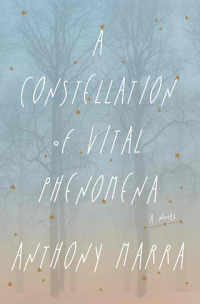Mercury Pictures Presents by Anthony Marra
 Monday, August 8, 2022 at 6:48AM
Monday, August 8, 2022 at 6:48AM 
Published by Hogarth on August 2, 2022
Mercury Pictures Presents is a sprawling but tightly controlled novel. Set before and during the Second World War, most key characters are Italian immigrants, although one is an American-born citizen of Chinese ancestry. While the novel is centered around a minor movie studio owned by two estranged brothers, its grand theme is America’s dependence upon and distrust of immigrants. That theme is captured in this description of an immigrant character: “There was nothing he wasn’t willing to fail at. Besides denying his racism, it was his most American quality.”
The brothers who co-founded Mercury Pictures are Artie and Ned Feldman. They had success making silent movies, but larger studios surpassed them with talkies. Ned works in New York handling the financial side of the business. Artie is in Los Angeles, overseeing the operation of the studio. Maria Lagana is Artie’s head of production, having worked her way up from typist.
Maria’s mother fled Italy with Maria when Mussolini exiled Maria's father, a prominent lawyer, to an internment colony in the Italian hinterlands. While in exile, Maria’s father saved young Nino Picone from drowning. He arranges for Nino’s informal adoption by the Cortese family. Nino works as a photographer, often taking passport photos that will be used in forged passports. He plans to travel to America with Maria’s father, who has acquired a forged passport of his own. That plan falls apart but, thanks to an act of sacrifice, Nino comes to America using the passport of Vincent Cortese.
The novel opens with Maria trying to get a proposed Mercury Pictures film approved by the Production Code Administration, a censor that, like the Senate, regards Hollywood as anti-American. Maria is the brains behind some of Mercury’s best films but she can’t get a producer credit, much less an executive position and decent salary, because of her gender. Maria lives with Eddie Lu, an American actor of Chinese ancestry who can’t get a decent role until after Pearl Harbor, when he becomes typecast playing Japanese villains.
Nino has been in the US for three years before he finds the courage to track down Maria in California. Maria blames Nino for abandoning her father but, for reasons she doesn’t quite understand, gives him a job as a photographer at Mercury. Nino works under his assumed identity but is always at risk of being exposed and perhaps branded as an Italian spy.
Foreign spies are on everyone’s mind. One of Mercury’s propaganda films claims that 25,000 Japanese residents of Los Angeles were sabotaging America, justifying the nation’s horrific internment of Japanese Americans because of their ancestry. The hatred that fuels wars causes Mercury to lose German and Italian employees because wartime laws prevent them from working with cameras or chemicals. Maria must carry an enemy alien registration card and will be arrested if she travels outside a small zone in LA.
The plot is a collection of memorable scenes and vignettes. Eddie Lu is a friend of Bela Lugosi, who resents being typecast after Dracula but regrets turning down Frankenstein after Boris Karloff became Hollywood’s go-to monster. Eddie understands what it means to be typecast. He cherishes Ibsen and Shakespeare but will never perform in film as anything other than a Japanese villain. “Studios strove to make ethnic characters more relatable to white America by casting them with actors who supposedly brought them one step closer to Anglo-Saxon: Chinese actors played Japanese characters, Jewish actors played Chinese characters, Catholic actors played Jewish characters, and Protestant actors played Catholic characters.”
In another scene that emphasizes America’s history of racism, the Army recruits a failed architect who works on set design for Mercury to build replicas of Berlin in Utah that can be destroyed in propaganda films. She supervises prison laborers who construct the buildings, including a young black man who insisted on being served at a lunch counter, setting events in motion that ended with the death of a German POW. The innocent teen is serving a life sentence despite playing no part in the German’s death. The architect was born in Germany and, while she is worried that the Army might hold her ancestry against her, she does not face the same kind of bigotry as the black teen.
While the novel tracks the lives of many characters, the story is primarily Maria’s, including the extended family she makes for herself. She is a victim of fascism in Italy and of nationalism in America, losing a father in Italy and a lover in the US while enduring a loss of liberty simply because she fled a country that went to war with America. Her moving story hits home when, in an epilogue, she returns to Italy to learn what she can about her father’s fate.
Mercury Pictures Presents offers a perfect blend of humor and drama. People are awful until a good one comes alone, making simple decency seem remarkable. Social commentary is poignant without becoming overbearing. The story evokes emotion without becoming saccharine. The plot takes the reader on entertaining detours without becoming lost. Dialog is intelligent and surprising. Historical research (cited in the acknowledgements) contributes to a detailed atmosphere, both in Hollywood and Italy. This is an award-worthy novel. I admired everything about it.
HIGHLY RECOMMENDED

